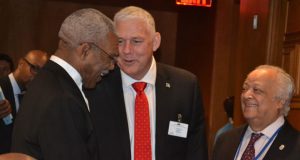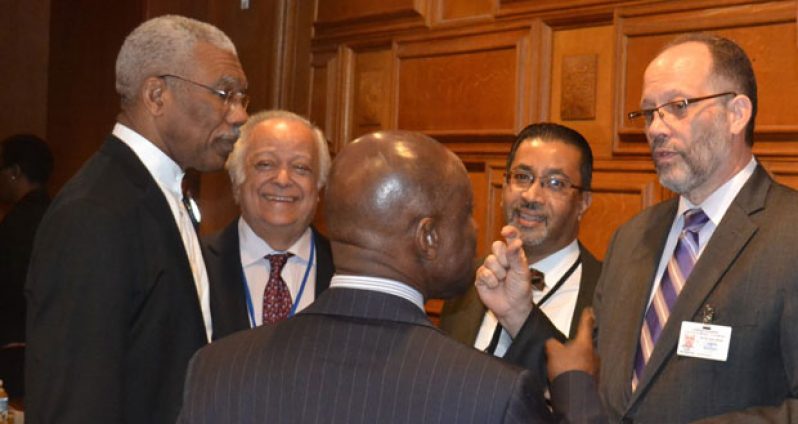…before moving to juridical settlement-Pres Granger
By Ariana Gordon in New York
THERE needs to be additional consultation and cooperation with the Bolivarian Republic of Venezuela on the Guyana-Venezuela border controversy before the United Nations Secretary- General moves the process forward.This was revealed on Friday by President David Granger following a meeting between CARICOM leaders and UN Secretary-General Ban Ki-moon at UN Headquarters, New York. President Granger said while the secretary-general alluded to the need for more consultations with Venezuela, “the door has not been closed.”
The UN Secretary-General is to meet with President Granger today on the matter. It is Guyana’s hope that before Ban Ki-moon demits office, he points the ongoing controversy to the International Court of Justice (ICJ). “As far as Guyana is concerned with [the] territorial controversy—[we] don’t want to start process again… we have come to the conclusion some 25 years ago that the Good Offices process is not working….our intention is to go forward.”

The Guyanese leader made it clear that while Guyana recognises the “shuttle diplomacy” which has taken place among Venezuela, Guyana and New York, there is satisfaction with the effort and focus placed on the controversy by the outgoing UN Secretary-General (SG). “We are satisfied that by now the SG would have been able to arrive at an assessment of positions taken by Guyana and Venezuela,” he stated.
Meanwhile, President Granger described the meeting of CARICOM heads of Government and the UN Secretary-General as “useful” and said the meeting was arranged so that the secretary-general would be apprised of some of the critical issues affecting the region. The president said CARICOM leaders also bade farewell to Ban Ki-moon, who will demit office on December 31. “He has been a great friend of the Caribbean… he has attended two Heads of Government meetings which is rare for SG of UN… a very busy person.”
He said that under the secretary-generalship of Ban Ki-moon, he pioneered one of the most important environmental agreements which would affect the development of small islands and developing states. “Most of the Caribbean as you know is made up of islands and therefore the threat of rising sea levels and global warming are prominent in terms of the environmental agenda… these are important achievements of Moon’s 10 years’ service.”
President Granger served as chairman of Friday’s meeting and invited six CARICOM member states to address the meeting: The Bahamas, Belize, Guyana, Haiti, St Vincent and the Grenadines and St Lucia. Belize and Guyana he said were mostly concerned with its territorial issues, while Haiti was concerned with the consequences of environmental disasters and the fact that several hundreds of involuntary migrants, those expelled from The Dominican Republic are suffering from an outbreak of cholera.
The Bahamas, St Lucia and St Vincent, were particularly concerned about the effects of correspondent banking and the fact that Caribbean countries have been stigmatised and treated unfairly. President Granger said each country is not being investigated individually, but as a bloc and as such the Region is being treated as “a bloc of delinquent states which is unfair.”
The UN Secretary –General, President Granger said, referenced the Guyana-Venezuela border controversy and noted that he is engaged with the two countries and acknowledged the concerns of the other territories. The issues of correspondent banking and de-risking fall outside of his portfolio.
The issue of global warming and climate change were also discussed and continues to be a cause for concern of Caribbean states. “It was a useful engagement…we are very happy… he is leaving on a good note in terms of his relations with Guyana,” said President Granger, who noted that the secretary-general presides over an array of complex programmes which include employment, youth, trafficking in persons, poverty alleviation, women and gender issues, reduction of diseases and the environment, to name a few.
Notwithstanding the aforementioned, the Guyana-Venezuela border controversy remains “top priority” for Guyana and President Granger said “we will continue to engage the secretary-general as far as possible to ensure that [the] matter is brought to a juridical settlement.”












